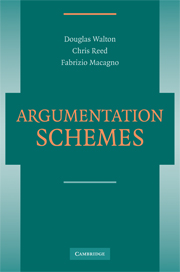Book contents
- Frontmatter
- Contents
- Acknowledgments
- Introduction
- 1 Basic Tools in the State of the Art
- 2 Schemes for Argument from Analogy, Classification, and Precedent
- 3 Knowledge-Related, Practical, and Other Schemes
- 4 Arguments from Generally Accepted Opinions, Commitment, and Character
- 5 Causal Argumentation Schemes
- 6 Schemes and Enthymemes
- 7 Attack, Rebuttal, and Refutation
- 8 The History of Schemes
- 9 A User's Compendium of Schemes
- 10 Refining the Classification of Schemes
- 11 Formalizing Schemes
- 12 Schemes in Computer Systems
- Bibliography
- Index
4 - Arguments from Generally Accepted Opinions, Commitment, and Character
Published online by Cambridge University Press: 05 June 2012
- Frontmatter
- Contents
- Acknowledgments
- Introduction
- 1 Basic Tools in the State of the Art
- 2 Schemes for Argument from Analogy, Classification, and Precedent
- 3 Knowledge-Related, Practical, and Other Schemes
- 4 Arguments from Generally Accepted Opinions, Commitment, and Character
- 5 Causal Argumentation Schemes
- 6 Schemes and Enthymemes
- 7 Attack, Rebuttal, and Refutation
- 8 The History of Schemes
- 9 A User's Compendium of Schemes
- 10 Refining the Classification of Schemes
- 11 Formalizing Schemes
- 12 Schemes in Computer Systems
- Bibliography
- Index
Summary
The schemes studied in this chapter typically represent arguments of a kind that are weak and subject to default. They work best as uses of plausible reasoning in situations of uncertainty and lack of knowledge. However, they are so fragile and prone to error that they have traditionally been treated in logic as fallacies under the headings argumentum ad populum and argumentum ad hominem. Even so, despite their inherent fragility and proneness to exploit prejudice, they can be reasonable arguments in many instances, and sometimes they may be the best kind of evidence we have to make a rational decision. First we address the kind of argument Aristotle called endoxic, meaning that it is based on an opinion accepted by the majority and/or by the wise (the experts). In logic, this form of argument is called appeal to popular opinion, but it might be less negative to label it argument from informed public opinion. Then we address ethotic argumentation, recognized by Aristotle as especially powerful. Ethos is the moral character of the speaker. It can be used to support an argument, but in the argumentum ad hominem, or personal attack on an arguer's character, it is used to discredit his argument. Many argumentation schemes fitting this general type have now been identified and studied, and much of the chapter is taken up with reviewing and discussing these schemes.
The connection between these two apparently different classes of argumentation schemes can be found in the analysis of the meaning of “plausibility.”
Information
- Type
- Chapter
- Information
- Argumentation Schemes , pp. 121 - 162Publisher: Cambridge University PressPrint publication year: 2008
